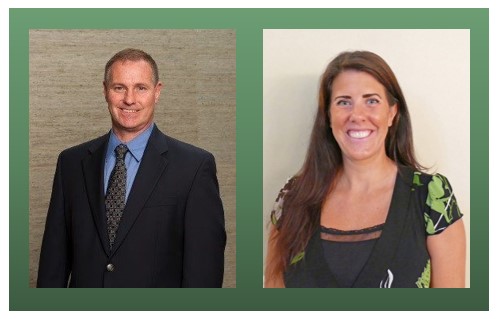Three Observations on Teacher Preparation From Local Educators

Rodel Teacher Council members Tim Brewer (Hodgson Vocational Technical High School) and Tara Saladyga (Delcastle Technical High School) serve as instructional technology coaches in their school building.
Every day, they collaborate with fellow teachers to help them improve professional development and incorporate evidence-based practices into the classroom so students achieve success in and outside of the classroom. We caught up with Tim and Tara to discuss teacher preparation, support, and development in Delaware. Read on for three insights from our conversations.
1) Technology in the classroom, while a blessing, can quickly overwhelm novice teachers.
TIM: It’s an overwhelming gauntlet. An experienced teacher can take 15-20 seconds to go in and upload a file or enter a grade, whereas somebody new could take a whole hour to get into the system, save the right passcode, and all that other stuff.
Yes, the younger teachers are tech savvy and that is great but it is still a boatload of information and time. Time that can make them feel like they are not making any progress on other things like building relationships or lesson planning.
TARA: I always equate [learning new technology] to drinking from a fire hose. You have to be able to log into (special education software) IEP Plus, you have to be able to log into e-school, you have to be able to log into our intranet, you have to be able to log into Schoology and Google.
It’s a lot getting all those accounts set up for new teachers and getting them comfortable with each one. You can’t automatically assume they know what they’re doing.
2) When it comes to supporting teachers, everyone requires something different. (Especially CTE instructors who took alternate routes to becoming teachers.)
TIM: Honest to God, when I first started teaching, nobody showed me how to operate the copier. They just assumed I knew how to. My lesson was all planned out but I just couldn’t print the materials to bring it to life.
TARA: I did not go to school to become a teacher. I earned a bachelor’s of science and worked as a scientist for many years. I now work with CTE instructors who now stand where I once was.
These individuals are intelligent, talented, and passionate about passing down their trade knowledge to students, but struggle with “education or academic speak” as we call it. Even just the term “pedagogy,” they’ve never been exposed to that word until they moved into the classroom. And let’s not even start with the acronyms.
As a coach and mentor, the support I offer them is different from the support I offer those who have studied teaching.
3) With the right supports, the teaching profession can take leaps and bounds forward.
TIM: Introducing new teachers to the classroom before school starts is crucial. If the state would allow the districts to bring in experienced teachers and novice teachers during the summer as an onboarding process, then that would be a step in the right direction.
The experienced teachers could actually run the new teachers, especially the ones right out of college, through classroom scenarios like adding your grades, categorizing and weighting your grade book, responding to coworker or parent emails… all that kind of crazy stuff.
I know, especially Wilmington University, tries to mimic as much of what’s going to take place your first year in teaching. And I think they’re really doing a good job with that because at least the new teachers that are coming in, they are better prepared.
TARA: If teachers—doesn’t matter if they are new to the profession or been in it many years—know that they have a support system in place, be it coaches, colleagues, administrators, if they feel supported, I feel like that goes so far.
Any place you work, you’re going to have a bad day. But if you feel supported and heard and you know that there is going to be somebody in the building to help you, you’re less likely to leave for a different job and I think that is just huge.
If teachers feel like they’re out on an island all by themselves, it’s not sustainable. Not in this profession. There is absolutely no way you can just lock yourself in your classroom and expect to survive.